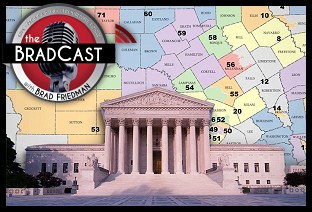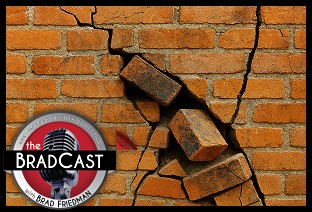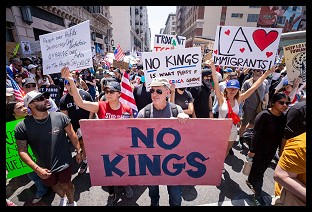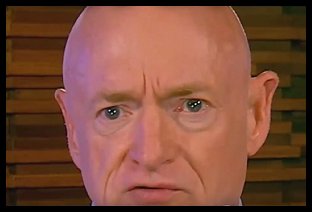 Let me say this up front, so you don't miss it this time: No, a Photo ID is not required to board an airplane. Period.
Let me say this up front, so you don't miss it this time: No, a Photo ID is not required to board an airplane. Period.
Last week, the ACLU filed an emergency appeal to the U.S. Supreme Court in hopes of having the 7th Circuit Court of Appeal's ruling --- which overturned a lower court's injunction on Wisconsin's new Photo ID voting restriction --- stayed in advance of next month's election.
Today (Monday) a rather remarkable new opinion was issued by the 7th Circuit which seems designed to serve as a last-minute assist to the Republican defendants in Wisconsin in their response to the ACLU appeal, as Justice Elena Kagan has required the state's response no later than 5pm on Tuesday. The ruling is littered with blatant falsehoods.
To recap very briefly, how we got to this point, and the astonishing claims in the 7th Circuit's opinion today: the GOP law requiring very specific types of state-issued Photo IDs for voting in Wisconsin was struck down earlier this year after it was found, by U.S. District Court Judge Lynn Adelman, to be both a violation of the U.S. Constitution and the federal Voting Rights Act. His thorough, 70-page ruling [PDF] found that some 300,000 legally registered voters in Wisconsin (nearly 10% of them) lacked the specific type of Photo ID that would now be needed vote under the new restriction. Adelman also determined that the law amounts to a "unique burden [which] disproportionately impacts Black and Latino voters" (who just happen to lean towards Democratic candidates), and that the new restriction on voting would "prevent more legitimate votes from being cast than fraudulent votes."
In mid-September, on appeal, a panel of three Republican-appointed judges on the 7th Circuit tossed out Adelman's permanent injunction with little comment. Amidst ensuing "electoral chaos", as election officials and voters in the state scrambled to make sense of the stunning last minute change to the law, just weeks before the mid-term election, the ACLU appealed for a rehearing before the full 7th Circuit. That hearing resulted in a deadlocked 5 to 5 vote by the judges (one seat on the court has been vacant since 2010), which meant that the partisan 3-judge panel's ruling, restoring the Photo ID restriction after it had been struck down by the lower court, now remains in place.
That brings us to the ACLU's emergency appeal to SCOTUS last week, and Monday's remarkable new opinion issued by the 7th Circuit at the last minute, clearly made to justify the original opinion issued last week which seems to have otherwise landed with a thud. (The court had attempted to compare a "need" to restore new voting restrictions at the last minute to the U.S. Supreme Court's stay placed on the overturning of same-sex marriage bans in several states last year. The dissenters called the court's legal theories "brazen", "shocking" and on its central thesis comparing the WI law to a 2008 landmark case in Indiana, "dead wrong.")
University of California-Irvine's election law professor Rick Hasen described the new opinion issued on Monday as "a nice assist from the 7th Circuit panel to the state of Wisconsin," just in time for the SCOTUS deadline.
In a more detailed follow-up item, however, Hasen, who is usually quite conservative when it comes to concerns about Photo ID voting restrictions, went somewhat ballistic. He uncharacteristically upbraided the 7th Circuit's newly issued ruling --- apparently written by the very rightwing Federalist Society member Judge Frank Easterbrook --- as "Horrendous".
"I rarely just rant in my blog posts," he tweeted, along with a link to his follow-up, "But Judge Easterbrook caused me to blow a gasket."
I know the feeling. I felt the exact same way while reading the new opinion today, particularly the part in which the court offers blatant --- and long-ago debunked --- falsehoods about where and when they claim Photo ID to be "essential", such as when boarding an airplane.
Trouble is, that is a blatant lie. A Photo ID is absolutely not required to board an airplane, no matter how many times proponents of these sorts of laws repeat the false claim. And it's simply remarkable that such a lie (and others akin to it) would be included in a last-minute opinion meant to justify an Appellate Court ruling that is about to be heard by the U.S. Supreme Court...
Setting aside how one feels about restricting the right to vote with partisan and discriminatory Photo ID laws (we're against it around here), courts determining the legality and Constitutionality of such laws ought to be able to agree on certain demonstrable facts, at the very least.
The 7th Circuit puts forward some new justifications for allowing the WI law to be enforced at the very last minute, even though they are just out and out false in some cases, entirely misleading in others. (It must also be noted that thousands of absentee ballots were already been sent out prior to their ruling, without the instruction that photocopies of a valid, state-issued Photo ID is now required when returning them under the 7th Circuit's ruling.)
I'm not an attorney, so I'll happily defer to those who are to hash out the specifics of the newly offered, exceedingly narrow circumstances under which Easterbrook appears to be defending the court's decision. It strikes me that he was attempting to thread what seems an impossible needle in order to declare WI's law neither in violation of the U.S. Constitution or the Voting Rights Act, as the U.S. District Court had found after a full trial on the merits of the law.
But for more on the actual legal justifications now being attempted by the court, please see the new 20-page ruling [PDF] itself, along with Hasen's quick "blown gasket" response here. And for much more detail, see the in-depth pieces by The BRAD BLOG's legal analyst Ernest A. Canning here, here, here, and here for example. The central portion of Easterbrook's latest explanation for restoring the restriction on voting at the very last minute before the election, appears to be an attempt to justify how WI's Photo ID voting law is not materially different from Indiana's law that was approved in the Crawford v. Marion County case back in 2008. Canning has broken down the differences in his pieces between Crawford and the WI law in great detail, as this case, and others such as the one in TX, have moved forward in the courts.
What I want to focus on here is just one paragraph in Monday's ruling, which is so full of demonstrable inaccuracies --- most of which have been debunked long ago --- that it's simply maddening they appear in a legal document issued by such a high court on such a contentious and important issue, and at such a late date.
The 7th Circuit's new ruling, in this part, attempts to justify some the notion that all good Americans should have and, yes, need Photo ID to survive at all in life. Easterbrook does this on behalf of the court by claiming, mostly falsely, the following:
Setting aside Easterbrook's obnoxious sniff at one of the expert witnesses who testified during the trial --- marginalizing their testimony as coming from a "marketing consultant" --- the fact is that the state has not challenged the 300,000 number offered at trial, and has even conceded both it and the fact that it amounts to some 10% of registered voters who lack the now-requisite Photo ID need for voting in the election to be held less than a month from today.
The full paragraph is just astonishing. There is so much nonsense in it, it's difficult to even know where to begin, so let's take Easterbrook's false and/or misleading assertions about photo ID one at a time...
• "Photo ID is essential to board an airplane"
No, it is not. That is a lie. And perhaps it's the largest one and most well-worn in the paragraph, as its a claim that has been used over and again by Republicans for years in order to justify Photo ID voting restrictions. No matter how many times the claim is made, however, it still remains untrue, as a quick look at the federal Transportation Security Administration (TSA)'s web page on "Acceptable IDs" for boarding a plane quickly and easily confirms.
From the TSA's short page:
In other words, the commercial airlines are not about to turn away some 30 million paying customers in the U.S. simply because they don't own a certain type of Photo ID, or because they failed to bring it with them to the airport for some reason. In such cases, the TSA uses other databases to verify the identify of the traveler, some of which are also likely used to identify voters when they register, given that there are many allowable forms of ID (not only strict, state-issued Photo ID that many do not have) which are already required to register to vote in all 50 states under the federal Help America Vote Act (HAVA).
Yes, it may make your life easier and quicker when traveling, if you have a current Photo ID, but you will not be barred from the privilege of "board[ing] an airplane" simply because you do not have one on you.
In 2012, for example, New York Times' Ann Carrns detailed her experience upon arriving for a flight without her photo ID:
"The special T.S.A. agent had me sign a form, allowing the agency to verify my identity. He asked me if I had any other form of identification (I didn't), or if my husband had anything in his wallet that had my name on it. (Again, no.)," she wrote. "Then, he called someone else on his phone, and asked me some questions --- things like my previous addresses and my date of birth. ... Apparently I answered satisfactorily, because the agent was finally given a number that he jotted on my boarding pass, before waving me on to be screened."
She had a similar experience on her return flight, when she still did not have the Photo ID she had accidentally left at home.
NYU Brennan Center's election law expert Justin Levitt calls the claim that a Photo ID is needed to board a plane "dead wrong". He speaks from personal experience, having flown without a Photo ID and testified about it to the U.S. Senate Judiciary Committee in 2012.
More importantly, however, unlike voting, boarding an airplane is a privilege, as opposed to a right.
Levitt describes the claim as "irrelevant", because "Voting is at the heart of our constitutional order, guaranteed to every eligible citizen. Boarding a plane is a nice perk. The republic doesn't crumble if the people don't fly on planes." In short, he says, the claim is "both completely irrelevant and completely inaccurate."
So the court's claim here --- repeated for years by wingnut proponents of Photo ID restrictions --- is simply false, inappropriate to the case, and has no place in court documents.
Hasen describes Easterbrook's claim about Photo IDs being needed "for boarding an airplane' as a "false claim[s]" that make his "blood boil". He, too, confirms, yet again, that "one does not need a photo id to fly".
• "Photo ID is essential to...enter Canada or any other foreign nation"
Perhaps. It's also "essential" to prove you have been vaccinated for malaria for the privilege of going to certain foreign nations. Would Easterbrook be okay with a vaccination requirement before exercising the right to vote on that basis as well? It's a silly argument.
• "Photo ID is essential to...drive a car (even people who do not own cars need licenses to drive friends' or relatives' cars)"
Aside from seemingly escaping Easterbrook, and the portion of the 7th Circuit Court on whose behalf he is writing, that driving a car is a privilege, not a right, there are millions of legally registered American voters who have never had a drivers license because they never wanted or needed one. Many of them, as it turns out, happen to live in large cities with excellent public transportation systems. Many of those perfectly eligible and legally registered citizens just happen to be minority voters. That fact would seem to elude the privileged Judge Easterbrook entirely.
And then there are the blind voters who never drove, and the elderly voters who no longer drive, just to name a few more million potentially-disenfranchised voters. But, again, Easterbrook --- and other proponents who have been using these same canards for years --- can't seem to imagine how they could possibly get by in life without the same conveniences that they themselves enjoy and haven't had to think about for years, much less scramble to obtain at the very last minute in order to exercise their right to vote in this year's election.
• "Photo ID is essential to...buy a beer"
Really? While I'm not a huge drinker, I enjoy a cold one every now and again. I'll soon be pushing 50 years old, yet I can't recall the last time I was required to show a Photo ID in order to "buy a beer". Claiming that one is "essential" in order to enjoy that privilege is, once again, a blatant lie and does not belong in an official ruling by an Appellate Court --- or any court, for that matter.
But, to underscore the point --- since this is also an oft-used phony talking point by the Right --- election law expert Levitt notes that, after being allowed through security at the L.A. Airport without a Photo ID, as described above, he then "enjoyed a beer in the airport Chili's --- without using photo ID." He says that after arriving in D.C., he "then made my way to the Dirksen Senate office building, and to the Committee's hearing room [to testify before the Judiciary Committee] --- without using photo ID."
• "Photo ID is essential to...purchase pseudoephedrine for a stuffy nose or pick up a prescription at a pharmacy"
As Hasen notes, "getting sudafed is not a constitutional right, and in any case, WI pharmacists likely accept all kinds of ids that are not ok for voting (like a veterans id) to buy Sudafed."
True. Moreover, my girlfriend has picked up prescriptions for me from the pharmacy on many occasions. She was never required to present my photo ID in order to do so, and says she didn't even need to present her own, other than when using a credit card to pay for the prescription.
Yet, this "Photo ID is needed to buy Sudafed!" bullshit continues, as it has for years, to be a favorite of the voter suppression crowd, no matter how false and/or misleading it is.
• "Photo ID is essential to...open a bank account or cash a check at a currency exchange"
As it turns out, I recently opened a new bank account. I was asked for my drivers license, and since I happen to have one, it was not a problem to present it. That said, I can't imagine that banks, like airlines, don't allow for other forms of ID when opening new accounts. It seems unimaginable that they would tell some 30 million Americans (customers!) --- not to mention children --- that they are not welcome to bank with them.
I haven't attempted to cash a check at a currency exchange lately, so can't speak to that. But, again, cashing a check in that way is a privilege, not a right, just like the other items, other than voting, mentioned here.
• "Photo ID is essential to...buy a gun"
I'm not familiar with the gun laws in every state, but given that guns may be purchased freely on the Internet, it seems hard to believe that a Photo ID is required. [Update: In 39 states Photo ID is not required when the purchase is between individuals.] If it is, a facsimile of a Photo ID might be required, which is fairly easy to produce at home for faxing or attaching via email. Moreover, a family member could use their Photo ID to help me purchase a gun from a dealer online or in person, but a family member's Photo ID would do no good for a legally registered voter who wanted to vote in Wisconsin in less than a month and didn't, by that time, already have their own.
• "Photo ID is essential to...enter a courthouse to serve as a juror"
As it turns out, I very recently served on jury duty. I do not recall being asked for a Photo ID upon entering the courthouse in Burbank (though I did go through a metal detector and my belongings were examined with an x-ray machine). If I misremember that, my apologies. On the other hand, if knowing that lacking a photo ID meant that I would not have been able to serve on jury duty, simply because I would not have been allowed into the courthouse, I suspect I, and many others, would have considered not bringing one to the courthouse when called to serve.
Examining my "Summons for Jury Service" here, I see no requirement to bring a Photo ID with me at the time. And a quick look at the Los Angeles County Superior Court's web page on Frequently Asked Questions for jurors suggests that "a government issued ID, such as a driver's license, passport that shows your photo and your correct name and adress" is only required in the event that a juror has recently changed their name and needs to change their corresponding jury record name.
• "Photo ID is essential to...watch the argument of this appeal."
I do not know what is required to attend Judge Easterbrook's 7th Circuit courtroom, or to attend a hearing at the U.S. Supreme Court, for that matter. I'll take his word for it that the tiny portion of Americans who attend his court's hearings in person or those at the Supreme Court need to present a Photo ID (even if it seems unlikely that a veteran of the armed forces would be turned away for presenting a veteran's ID, as is the case under some Republican Photo ID voting restrictions.)
• "Could 9% of Wisconsin's voting population really do none of these things?"
In fact, Wisconsin's voting population can do almost all of those things that Easterbrook and the 7th Circuit are now pretending cannot be done without a valid, state-issued Photo ID in the latest ruling meant to convince the rightwingers on the U.S. Supreme Court to uphold their unjustifiable ruling.
SCOTUS may ultimately allow the 7th Circuit's "horrendous" ruling to stand, despite the High Court's long insistence that voting rules not be altered at the last minute before an election. Or, they may stay the 7th Circuit's ruling to allow the matter to be heard after the heat of this election, in which WI's Republican Gov. Scott Walker, an ardent Photo ID restriction proponent, currently faces a "toss up" re-election bid against Democrat Mary Burke.
But even the right-leaning Will Baude, of the University of Chicago Law School observed at the Washington Post that the 7th Circuit's limp original opinion --- which Monday's new opinion seems to serve as a mulligan to --- didn't include the words "irreparable" or "injury". Interestingly, Monday's new opinion doesn't contain either of those words either.
In other words, there is no good reason for, and nobody (other than, perhaps, Republicans hoping for a partisan advantage) who will be irreparably harmed by waiting until after the mid-term elections to hear full arguments for and against this law, and other similar GOP laws recently enacted elsewhere, at the Supreme Court. So, it seems, Easterbrook and his ideological companions on the 7th Circuit are attempting to simply make some up --- even if it means that many legal voters will be irreparably injured when they lose their right to vote in November.
Shameful.
(Snail mail support to "Brad Friedman, 7095 Hollywood Blvd., #594 Los Angeles, CA 90028" always welcome too!)
|


 SCOTUS Ruling a How-To for Unlawful Gerrymandering on 'Eve' of Critical Election Year: BradCast' 12/17/25
SCOTUS Ruling a How-To for Unlawful Gerrymandering on 'Eve' of Critical Election Year: BradCast' 12/17/25 Bricks in the Wall:
Bricks in the Wall: 'Green News Report' 12/16/25
'Green News Report' 12/16/25
 'This One Goes to 11': Weekend of Violence, Tragic Murder of Rob Reiner: 'BradCast' 12/15
'This One Goes to 11': Weekend of Violence, Tragic Murder of Rob Reiner: 'BradCast' 12/15 Sunday 'WTF?' Toons
Sunday 'WTF?' Toons Trump Now Losing One
Trump Now Losing One 'Green News Report' 12/11/25
'Green News Report' 12/11/25 Dems Continue Stunning 2025 Election Streak: 'BradCast' 12/10/25
Dems Continue Stunning 2025 Election Streak: 'BradCast' 12/10/25 Petrostates and Propagandists Undermining Climate Science: 'BradCast' 12/9/25
Petrostates and Propagandists Undermining Climate Science: 'BradCast' 12/9/25 'Green News Report' 12/9/25
'Green News Report' 12/9/25 The High Cost of Trump's Terrible Policy Making: 'BradCast' 12/8/25
The High Cost of Trump's Terrible Policy Making: 'BradCast' 12/8/25 Sunday 'All in a Day's Work' Toons
Sunday 'All in a Day's Work' Toons Dems Fight to Avoid the GOP's Massive, Year-End Health Care Cliff: 'BradCast' 12/4/25
Dems Fight to Avoid the GOP's Massive, Year-End Health Care Cliff: 'BradCast' 12/4/25 'Green News Report' 12/4/25
'Green News Report' 12/4/25 A 'Flashing Red Warning Sign' for GOP: 'BradCast' 12/3/25
A 'Flashing Red Warning Sign' for GOP: 'BradCast' 12/3/25 Hegseth, War Crimes and DoD's 'Politicization Death Spiral': 'BradCast' 12/2/25
Hegseth, War Crimes and DoD's 'Politicization Death Spiral': 'BradCast' 12/2/25 Follow the
Follow the  With Thanks, No Kings and Good Cheer
With Thanks, No Kings and Good Cheer Presidential Illegality and Duty to Disobey
Presidential Illegality and Duty to Disobey President of United States Calls for Killing Democratic Officials: 'BradCast' 11/20/25
President of United States Calls for Killing Democratic Officials: 'BradCast' 11/20/25 Is MAGA Finally Beginning to Fall Apart?: 'BradCast' 11/19/25
Is MAGA Finally Beginning to Fall Apart?: 'BradCast' 11/19/25 Trump's Terrible, Horrible, No Good, Very Bad Week: 'BradCast' 11/18/25
Trump's Terrible, Horrible, No Good, Very Bad Week: 'BradCast' 11/18/25
 VA GOP VOTER REG FRAUDSTER OFF HOOK
VA GOP VOTER REG FRAUDSTER OFF HOOK Criminal GOP Voter Registration Fraud Probe Expanding in VA
Criminal GOP Voter Registration Fraud Probe Expanding in VA DOJ PROBE SOUGHT AFTER VA ARREST
DOJ PROBE SOUGHT AFTER VA ARREST Arrest in VA: GOP Voter Reg Scandal Widens
Arrest in VA: GOP Voter Reg Scandal Widens ALL TOGETHER: ROVE, SPROUL, KOCHS, RNC
ALL TOGETHER: ROVE, SPROUL, KOCHS, RNC LATimes: RNC's 'Fired' Sproul Working for Repubs in 'as Many as 30 States'
LATimes: RNC's 'Fired' Sproul Working for Repubs in 'as Many as 30 States' 'Fired' Sproul Group 'Cloned', Still Working for Republicans in At Least 10 States
'Fired' Sproul Group 'Cloned', Still Working for Republicans in At Least 10 States FINALLY: FOX ON GOP REG FRAUD SCANDAL
FINALLY: FOX ON GOP REG FRAUD SCANDAL COLORADO FOLLOWS FLORIDA WITH GOP CRIMINAL INVESTIGATION
COLORADO FOLLOWS FLORIDA WITH GOP CRIMINAL INVESTIGATION CRIMINAL PROBE LAUNCHED INTO GOP VOTER REGISTRATION FRAUD SCANDAL IN FL
CRIMINAL PROBE LAUNCHED INTO GOP VOTER REGISTRATION FRAUD SCANDAL IN FL Brad Breaks PA Photo ID & GOP Registration Fraud Scandal News on Hartmann TV
Brad Breaks PA Photo ID & GOP Registration Fraud Scandal News on Hartmann TV  CAUGHT ON TAPE: COORDINATED NATIONWIDE GOP VOTER REG SCAM
CAUGHT ON TAPE: COORDINATED NATIONWIDE GOP VOTER REG SCAM CRIMINAL ELECTION FRAUD COMPLAINT FILED AGAINST GOP 'FRAUD' FIRM
CRIMINAL ELECTION FRAUD COMPLAINT FILED AGAINST GOP 'FRAUD' FIRM RICK SCOTT GETS ROLLED IN GOP REGISTRATION FRAUD SCANDAL
RICK SCOTT GETS ROLLED IN GOP REGISTRATION FRAUD SCANDAL VIDEO: Brad Breaks GOP Reg Fraud Scandal on Hartmann TV
VIDEO: Brad Breaks GOP Reg Fraud Scandal on Hartmann TV RNC FIRES NATIONAL VOTER REGISTRATION FIRM FOR FRAUD
RNC FIRES NATIONAL VOTER REGISTRATION FIRM FOR FRAUD EXCLUSIVE: Intvw w/ FL Official Who First Discovered GOP Reg Fraud
EXCLUSIVE: Intvw w/ FL Official Who First Discovered GOP Reg Fraud GOP REGISTRATION FRAUD FOUND IN FL
GOP REGISTRATION FRAUD FOUND IN FL

































